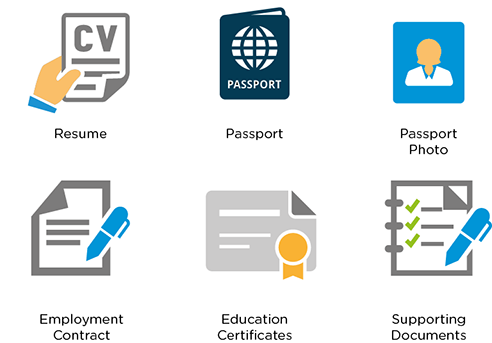
By
Diyaa Mani
July 10, 2023
Updated
January 20, 2025
Unsurprisingly, organisations are keen to expand their business operations to Malaysia. As one of Asia’s top business hubs, it is a developed economy with rapidly improving skills, technology and advancing infrastructure.
Home to the 14th biggest natural gas reserve and 23rd largest oil reserves in the world, Malaysia’s energy industry is highly competitive.
But foreign employees need a work permit, better known as an Employment Pass, to work in Malaysia.

We’ve compiled a helpful guide to explain the employment pass, how to apply for one and everything your company must provide for a successful application.
To locate the subtopic relevant to you, refer to the table of contents below:
What is an Employment Pass?
An Employment Pass (EP) is a work permit, or visa, that enables expatriates to work in Malaysia. It is primarily available for senior or technically skilled professionals with specialist work experience and typically on higher salaries.
The EP provides foreign talent with an employment contract lasting up to 60 months, allowing them to live and work legally in the country.
An employment pass holder can be employed in West Malaysia, provided the hiring company has registered with the immigration department. Employment passes can be considered for renewal, depending on the requirements.
There are two main types of EP permits in Malaysia:
1. Employment Pass (Category I)
To be eligible for these types of EP, applicants must earn a basic minimum monthly income of RM 10,000 per month (USD2,089) and have an Employment Contract up to (5) years.
2. Employment Pass (Category II)
Applicants must meet the minimum monthly salary requirements of RM 5,000 and up to RM 9,999 per month and have an Employment Contract up to (2) years.
Important Notes:
- Effective 1st January 2021, employers who intend to hire expatriates are required to advertise job vacancies on the job portal under the Ministry of Human Resources for a minimum 30 days. This requirement applies to positions with a salary below RM 15,000 per month.
- Important positions such as (C-Suite & Key Posts) and expatriates earning a monthly income of RM 15,000 per month and above, are automatically exempted from this implementation.
How do I apply for employment pass approval?
The Expatriate Committee (EC) or relevant authorities in Malaysia, must approve foreign workers to fill a position before the issuance of an Employment Pass can be made by the immigration department
For the hiring company to make an application, foreign nationals will need to provide the following:
- The latest version of their Resume
- A copy of their passport (this needs to include all pages)
- A recent passport photo with a blue background
- A copy of their employment contract (signed and duty stamped by the Inland Revenue Board) and job description
- Copies of their highest educational certificates (translated into English by a certified translator) and a Certified True Copy (CTC) by the Embassy/High Commission/Consulate General in Malaysia, or the HR head of the hiring company. The certificates must also be apostilled by the relevant authorities in the applicant's home country
- The application form for the employment pass
- The supporting document from the approving agency or regulatory body (if applicable)
- Any other documents specified during the application process

Once all the documents have been received, the Hiring Company will lodge the application form and begin the review process.
Employment Passes can be renewed for a period of up to 60 months. Application for renewal of EPs requires the following documents:
- A copy of the applicant's passport (all pages)
- A recent passport photo with a blue background
- A copy of the applicant's latest employment contract (signed and duty-stamped by the Inland Revenue Board)
- 3 months' latest payslips
- Latest income tax filing documents
- The latest version of their resume
The costs associated with applying for an Employment Pass in Malaysia are subject to change, and it is advisable to check the official website for information regarding the current fees.
Commonly asked questions relating to EP applications
1. Is it the hiring company or employee that applies for an employment pass in Malaysia?
The employing organisation is responsible for applying before you travel to Malaysia. Firstly, they must request approval to hire for an Expatriate Post. Once this is approved, apply via the Immigration Department of Malaysia. The Immigration Department of Malaysia has launched a new online portal to apply for employment passes, which can be accessed here.
2. Are there alternative entry visas or work permits available?
Yes, expats seeking a short-term Malaysian work visa (less than 12 months) can apply for a Professional Visit Pass. Pass holders can temporarily provide services or undergo practical training with a Malaysian company on behalf of an international firm
3. Can I bring my family to Malaysia with an employment pass?
Employment pass holders can also bring their legal spouse and dependent children using Dependent Passes.
Their parents, parents-in-law and unmarried children over 18 will also be permitted, with a Long-Term Social Visit Pass.
4. How long does it take to process an employment pass application?
EP permits are typically processed within five (5) working days once all the relevant documents have been received.
Once approved, the Approval Letter of (EP) will be issued to the Hiring Company, and you are required to apply for a single-entry visa online through the eVisa website (if applicable).
Once you have obtained the approval, you are now eligible to travel to Malaysia and commence employment.
Once you are in Malaysia, your new employer has thirty (30) days to submit your passport to the Immigration Department of Malaysia for them to stamp your passport with the EP details. Once stamped, you can remain and work until the EP expiry date, unless terminated earlie
Are you looking for support with employment passes, expatriate visas or work permits?
Working alongside an employer of record specialist like Airswift simplifies the process of applying for employment passes or visas in Malaysia - or any of our locations.
Find out more about Airswift's experience and business services in Malaysia
